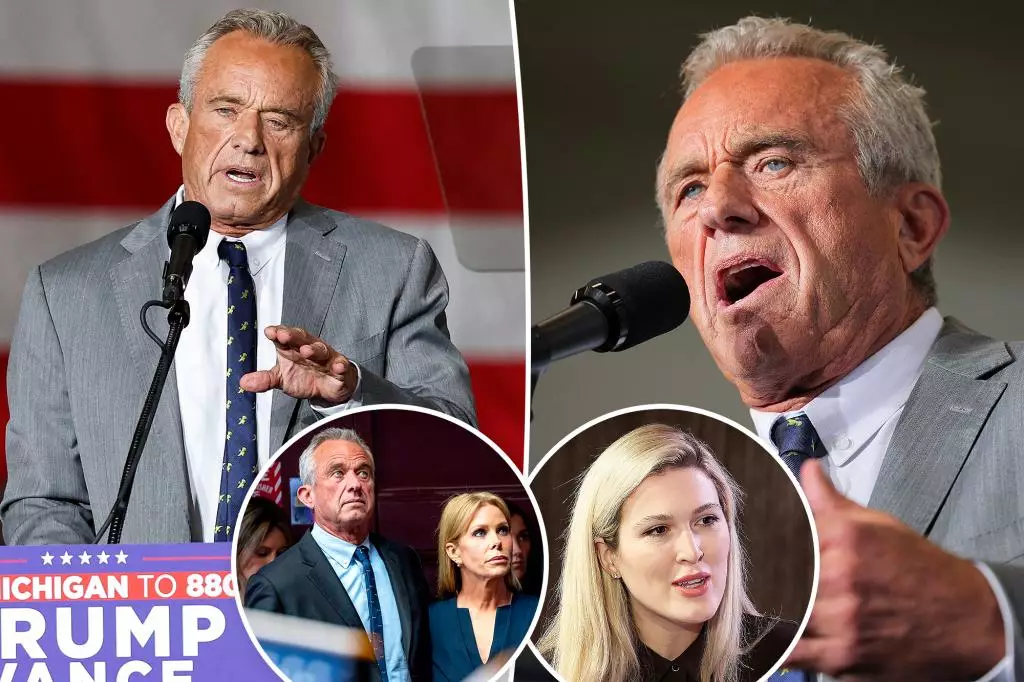In the ever-changing landscape of American politics, few figures evoke as strong a response as Robert F. Kennedy Jr. The recent sexting scandal involving the former presidential candidate and New York Magazine writer Olivia Nuzzi has undoubtedly captured public attention. Yet, amid the swirling controversy, Kennedy maintains his public persona with a level of nonchalance that raises eyebrows. Recent appearances, especially at a Senate roundtable discussion on nutrition in Washington, D.C., illustrate how this complex figure navigates the dual challenges of political aspiration and personal controversy.
The Congressional Panel on Nutrition
At the Senate roundtable titled “American Health and Nutrition: A Second Opinion,” Kennedy was alongside notable figures like fitness expert Jillian Michaels, psychologist Dr. Jordan B. Peterson, and several health advocates. Despite the tumultuous backdrop of his personal life, witnesses reported that Kennedy appeared composed and engaged during discussions. Those in attendance noted a stark contrast between the gravity of the subject matter—highlighting the overpowering influence of food and pharmaceutical corporations—and the personal turmoil Kennedy was experiencing. According to one source, “It was an incredible day,” capturing the urgent call for accountability in American health and nutrition policies.
Kennedy has long positioned himself as a public health advocate, critical of industrialized food systems and the policies that support them. During the panel, he reiterated his stance against what he describes as the pervasive corruption in government agencies like the USDA and FDA. With concerns about misleading ingredient labels and poorly regulated products, Kennedy effectively linked his advocacy for health with broader systemic issues within the food industry.
Kennedy’s political moves have been strategically aligned with the escalating challenges he faces. His controversial endorsement of Donald Trump following the suspension of his presidential campaign is emblematic of his effort to remain relevant in the political arena. In a public speech, he provocatively argued for a health-centric presidency, suggesting that the nation deserves leadership focused on improving public well-being. This approach cleverly situates him within the broader dialogues of health and power, even as his personal life threatens to overshadow his professional ambitions.
His public comments about health issues offer a glimpse into his political ideologies; for instance, he asserts that obesity, once a rarity, has exploded into a public health crisis largely due to corporate malpractice. During discussions, Kennedy opines that past societal attitudes towards obesity demonstrate a significant shift influenced by modern dietary practices and corporate interests. While many may find merit in his arguments, the juxtaposition of his personal controversies with his public health messaging raises questions about his credibility and long-term aspirations.
While Kennedy continues to advocate tirelessly for a revamped approach to public health, his recent interactions concerning his personal life reveal challenges in maintaining his public image. In a press conference where he was questioned about his relationship with Nuzzi, he sidestepped inquiries regarding regrettable actions, opting instead to focus on broader issues like health and international policy. This choice could be viewed as a strategic maneuver to distance his professional responsibilities from his personal dynamics, yet it also illustrates a potential disconnect between his controversial private life and authoritative public persona.
Kennedy’s unwillingness to delve deeper into his scandal may reflect a calculated decision to protect his political ambitions. However, the implications are significant: as he engages in discourse about public health, ethical considerations become increasingly intertwined with his messaging. A leader’s integrity often directly influences their effectiveness and legacy, raising questions about how Kennedy’s recent controversies may impact his credibility moving forward.
Robert F. Kennedy Jr. is undoubtedly a polarizing figure; his unwavering stance on public health and nutrition challenges established norms, and his candidacy represents a distinctive voice within American politics. Yet, as he grapples with personal scandals and vacant public sentiment, the effectiveness of his advocacy could be put to the test. As he continues to confront the scrutiny that comes with his dual roles of public servant and private citizen, it remains to be seen whether he can successfully navigate these challenges and sustain his influence in a highly competitive political landscape. In an era where public perception plays a pivotal role in political viability, Kennedy’s journey serves as a reminder of the intricate dance between personal integrity and public trust.


Leave a Reply